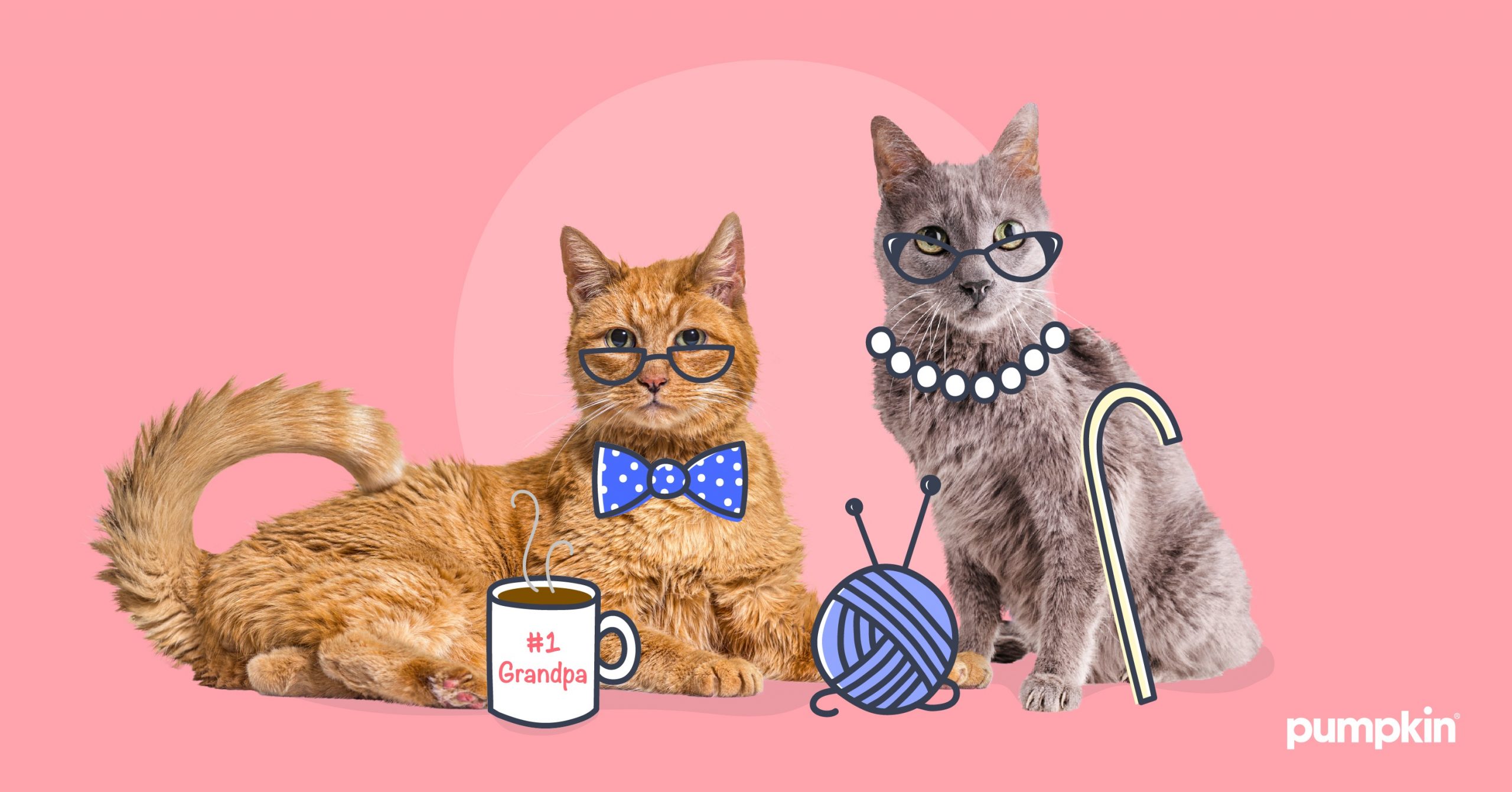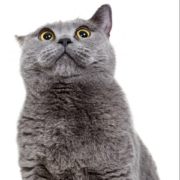Any loving cat parent will tell you that their fur ball’s well-being is always top of mind. Of course, this never changes as your cat ages and unfortunately becomes more susceptible to injury and illness.
Enrolling your older or senior cat in a cat insurance plan is a great way to help support them and help them get essential medical care throughout their golden years. As they face more health challenges, pet insurance can help you pay for eligible veterinary care for accidents & illnesses that they may need. So why does it seem like pet insurance policies are harder to come by for older cats?
Although it may seem counterintuitive, some pet insurance providers don’t provide as many plan options for older cats. We’ll get into this more later.
Despite this hurdle, it is not too late to enroll your kitty in a plan of their own. We’re breaking down the ins and outs of pet insurance for older cats to help you make the right decision for your furry friend!
When are cats considered “senior” or “geriatric”?
Some pet insurance plans enforce upper age limits, which means they reduce or do not offer coverage based on a pet’s age. This may leave you wondering, at what age is my cat considered “senior”?
Although it can be difficult to define when a cat becomes a senior, cats are typically considered seniors between the ages of seven and 10 years old. “Senior” cats are generally healthy but are beginning to show signs of aging, whereas “geriatric” cats are towards the end of their lifespan, and may be experiencing multiple health issues.
The aging process varies for pets based on different factors, including their size, environment, breed, and overall health. Larger cat breeds, like Maine Coons, for example, have shorter lifespans than standard-sized cat breeds, like American Shorthairs.
How often should a senior cat see the vet?
Senior cat ownership can feel like a whole new world at the vet’s office. Cats over the age of 11 should see the vet at least twice a year for routine checkups. Your veterinarian will be able to detect any health issues early on, when they’re easier to treat, and can stay on top of any health issues your cat may already have. As cats age, blood work done during their checkups become more important, as this can detect the early stages of serious health issues.
Some pet insurance providers have optional wellness plans or preventive care coverage options that can help you pay for the routine care your older pets need such as annual exam fees. Pumpkin has an optional wellness package called Preventive Essentials to help you do just that. It gives you a 100% refund for your cat’s annual wellness exam fee, a key vaccine, and a yearly parasite screening test. Though not an insurance plan, this optional add-on package can still help you save on the critical care your pet needs.
Is veterinary care more expensive for older cats?
This really depends on your cat and the health issues they may face as they age. Since older cats typically do have more health needs, the monthly cost of their veterinary care will likely be more expensive. Plus, any individual veterinary bill for the treatment of a serious condition like cancer or kidney failure can be very costly.
Does pet insurance cover senior cats?
Age is important when it comes to pet insurance coverage, as some pet insurance plans either limit or reduce coverage for senior cats, impose an age limit, or don’t offer coverage at all.
For example, Embrace accident & illness insurance plans have an upper age limit of 15 years old for new enrollments. Beyond that, your pet is only eligible for an accident-only insurance plan. Pumpkin plans don’t have upper age limits for enrollment or limited coverage options for older pets.
Is pet insurance more expensive for older cats?
Exactly how much cat insurance costs is usually dependent on a number of factors such as your location from California to New York, your type of pet insurance plan, your cat’s breed, size, and you guessed it, age.
In general, a plan for your senior cat will cost more than a plan for a younger pet. Having said that, annual or monthly insurance premium pricing, deductibles, and exclusions vary widely amongst cat insurance plans so it pays to do some research into the ideal plan for you and your cat.
Since cats are more susceptible to health issues as they age, older cats do tend to have more expensive vet bills coming in at a higher frequency than a kitten or a healthy adult cat would, so having pet insurance coverage is even more essential.
If you have more than one senior cat at home, some pet insurance plans may offer a multi-pet discount for enrolling them all in a plan. Cat Insurance plans offer a 10% multi-pet discount for every additional pet you enroll!
Whatever plan you choose, just know it is 100% possible to find affordable pet insurance plans with extensive coverage for your senior cat’s unique needs.
What pet insurance plans are available for older cats?
When it comes to insuring older cats, there are many different pet insurance providers and plans to choose from – but keep in mind that not all providers offer plans with as extensive coverage for older cats. Some pet insurance providers will limit coverage for older pets to accident-only plans i.e they’ll cover unexpected accidents, but offer no coverage for illnesses. This is less than ideal, as the likelihood your senior cat will cope with a common illness like kidney disease is pretty high.
For example, Pumpkin insurance plans have no upper age limits for accident & illness coverage. Pets 14 years old and older are not eligible to enroll in Trupanion insurance plans.
What can pet insurance cover for my senior cat?
Before choosing a plan, make sure it doesn’t exclude coverage your senior cat may need, and that they don’t impose an age limit. You should also know your chosen plan’s policy on the following coverage as your cat may need these as they age.
- Accident & illness coverage
- Vet visit exam fees (important as your vet visits will likely increase for an older cat)
- Hereditary conditions, like polycystic kidney disease and deafness
- Chronic conditions, like diabetes and arthritis
- Breed-specific conditions, like Manx syndrome
- Diagnostic testing, like x-rays and ultrasounds
- Rx medication, food, and supplements
- Alternative therapies, like physical therapy and hydrotherapy
- Dental illnesses, like gum disease
- End-of-life services, like cremation and euthanasia
- Exclusions for your cat
Do cat insurance plans cover end-of-life services?
Losing a pet is one of the hardest things any pet parent has to go through. During such a difficult time, the last thing you’re thinking about is how much end-of-life services will cost. That’s why some pet insurance plans, like Pumpkin plans, offer coverage for services such as cremation, burial, and euthanasia. Though nothing can fully ease the pain, it’s one small way your pet insurance plan can be there for you and hold space for you to grieve.
Is pet insurance worth it for older cats?
Enrolling your adult or older cat in a pet insurance plan is absolutely worth it! Though you may run into hurdles with upper age limits and pre-existing conditions, we recommend persevering. These days, cats can live into their teens and even their twenties, so having pet insurance that ages as gracefully as they do can prove to be priceless.
Pet insurance isn’t just for kittens – it can be worthwhile for older cats, too. As our furry friends age, they become more prone to certain health issues such as arthritis, cancer, as well as hearing and vision loss. They have a harder time fighting off infection and disease, and pet insurance can provide reimbursement for eligible vet bills for their illnesses.
How to care for a senior cat
Proactive planning and daily care is the best way to care for a senior cat and keep them as healthy as possible. Here are some ways to help your kitty avoid health issues as they age:
- Maintain their diet. Senior cats have unique dietary needs as they need to stay at a healthy weight to maintain optimum health. Talk to your veterinarian about when you should transition your cat to senior food, and how much food they should eat.
- Ensure they get plenty of exercise. Activities and playtime are essential elements of a cat’s life. It’s important for cats to stay physically and mentally stimulated as they age.
- Brush your cat’s teeth regularly. Dental disease is a very common ailment in aging cats and can poorly affect their quality of life. So, paying extra attention to your kitty’s dental health as they enter their golden years is very important to avoid painful disease and expensive medical procedures.
How do I choose the right pet insurance plan for my cat?
Ultimately, a good pet insurance plan for an older cat is one that helps you afford the best care possible. Though pre-existing conditions and upper age limits may pose hurdles, there are plans out there that can meet your cat’s unique needs.
When it comes to confronting unexpected bumps in the road, you want to be prepared. From emergency care to hospitalizations for those unexpected accidents & illnesses, our cats’ golden years can bring so much joy but some heartache along the way too. A good pet insurance plan can help provide support for you and your pet during those times.
Senior pets are our family members, so getting them top-notch pet care for unexpected accidents & illnesses is a priority – pet insurance can help you do just that.
Still not sure which is the best pet insurance plan for you? Compare plans and fetch a free cat insurance quote from Pumpkin to be one step closer to helping protect your feline friend.
DISCLOSURE




